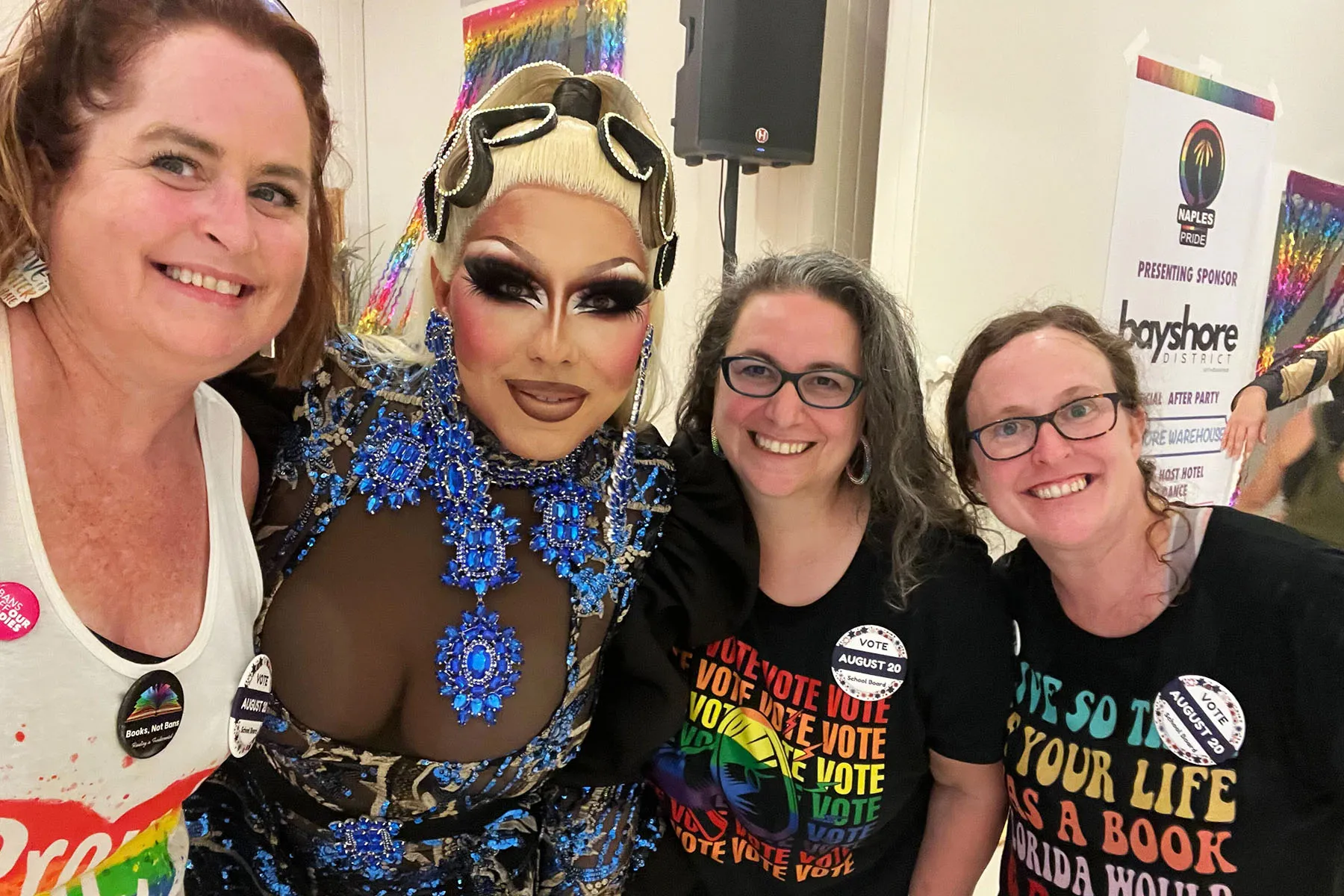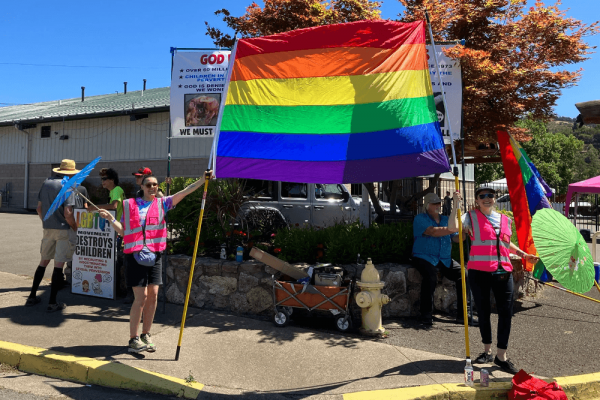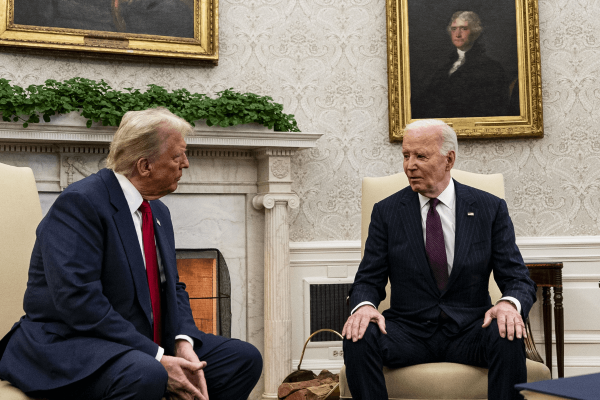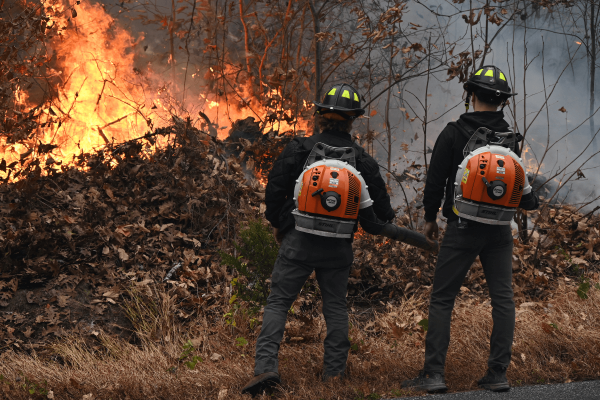Originally published by The 19th
It was a simple wave that changed things for Frankie Leigh.
Last summer’s Douglas County Pride festivities were wrapping up. It had been eight hours in near 90-degree heat, eight hours of picketers yelling at Leigh that they were going to hell. And just as the crowds were scattering, a protester called to Leigh.
“See you next year!”
Leigh couldn’t help but laugh. “It was that realization of like, I am going to see you every year,” Leigh said. “And I’ll probably see you in the grocery store and at the school board meeting and at these other places, too.”
Roseburg, Oregon, a rural coastal town three hours south of Portland, with a population just over 23,500, is relatively small. The people condemning Leigh to hell were their neighbors.
Leigh had been asked to help protect the 2023 Pride event by serving as a buffer between protesters and attendees. De-escalation in protest is generally understood as working to calm tensions and reduce conflict. But not everyone doing that work has the same idea about what that looks like. In some cases, de-escalation teams stand as a physical barrier between protesters and event attendees. In other instances, they try to talk with protesters. The goal is generally to keep everyone safe.
Leigh was learning that sometimes this didn’t mean acting as security, but doing actual outreach. That might mean making time and space to listen to hate speech. It might mean offering food or water.
Maureen O'Leary, senior director of field and organizing at Interfaith Alliance, said the goal is to have faith communities use “faith as a bridge and not a bludgeon.”
“We are pulling pieces out of the narrative that you know, anti-LGBTQ religious activists would like to claim, that it is faith versus LGBTQ identity,” said O’Leary, an Episcopalian.
The project, named “Faith for Pride,” is in its third year. It is difficult and sometimes dangerous. National LGBTQ+ media organization GLAAD reported that the United States saw 145 hate incidents at Pride celebrations last year alone. Six were categorized as assault. In one instance, a woman was killed at a gas station outside of Austin, Texas, after a man allegedly yelled homophobic slurs at her.
Those incidents have come against a backdrop of increasing anti-LGBTQ+ legislation, particularly bills targeting transgender people. In the last two years alone, state legislatures have considered 1,197 anti-transgender bills. Of those, 129 have passed.
Advocates contend that this has fueled attacks against queer Americans, especially during Pride Month. In Naples, Florida, organizers of the community’s Pride fest were forced to move this year’s drag show indoors for the safety of performers and attendees.
Amy Perwien, a member of the Interfaith Alliance of Southwest Florida, attended the festivities in Naples on June 8 both as a community member and volunteer observer for Interfaith Alliance. Outside, picketers waved signs telling attendees to repent, or that “Jesus Christ does not accept you as you are.”
“I have made a choice to see the signs, hear the words, and turn that into motivation for advocacy,” said Perwien. Perwien has come to speak out at Pride events and school board meetings. She is a member of the steering committee for Interfaith Alliance of Southwest Florida. She acknowledges that the work in Florida is difficult, but she also feels like it’s making a difference.
“I get asked a lot if the tide is turning, and what I usually say is that I see cracks,” Perwien said. “I saw things fail this current legislative session that I believe last year would have passed.”
In February, a bill that would have banned pride flags on government buildings failed in committee. Another bill that banned talking about LGBTQ+ identity in the workplace didn’t even get to committee. In June, a federal judge struck down restrictions on gender-affirming care for adults and minors.
In some cases, the threats are more severe than just anti-LGBTQ+ rhetoric. Leigh, who co-founded a group called Pride Peacebuilders last year specifically to do de-escalation work at LGBTQ+ events, has come face-to-face with armed protesters and angry mobs and been in tense standoffs between pride-goers and demonstrators. Leigh advises trainees to defuse the protesters by offering them cold bottled water or even a listening ear, and against photographing or recording them.
Jai Davis, faith organizer for Equality Georgia, is participating in this year’s Faith for Pride initiative. They said they have found de-escalation to be a powerful tool in their work for years.
Earlier this year, Equality Georgia enlisted faith leaders from across the state to oppose a “religious liberty” bill that advocates say would have empowered businesses to discriminate against queer people. The clergy held a news conference and spoke with lawmakers, pressing them to vote against the bill.
“It was just such a powerful moment. I asked faith leaders ranging from rabbis to Episcopalian priests to Baptist preachers, who came out,” Davis said. “To me, when the legislators heard that story or heard those narratives, it de-escalated a lot.”

Equality Georgia has used these tactics over and over to defeat every anti-trans bill introduced in 2024, 13 in total. In August, national LGBTQ+ nonprofit Lambda Legal will honor the group for what it called a “heroic” effort in stopping the bills.
Now, Davis says their organization will put those values into practice during June, especially in faith communities of color where many LGBTQ+ people might want to keep their ties to their congregations.
Many of the faith leaders attending pride are LGBTQ+ clergy. A good number, however, are straight allies or the parents of queer youth. They are looking for ways to show up in an increasingly fraught world. Their primary goal is to keep attendees safe from the rising vitriol and violence at these events.
“That is informed by real research and has a lot of grounding in the real needs that folks are facing on the ground,” said O’Leary.
“It kind of became this, like, I'm listening to your transphobic, yucky stuff you're saying off to the side, and trans kids who are coming to pride, or families who are coming to Pride, don't have to be the ones to hear it,” Leigh said.
O’Leary and Leigh teach that anti-LGBTQ+ protesters show up at Pride because they are suffering. They cite Dr. Geoffrey Cohen, a Stanford psychologist, who argues that people stay in hate groups because they are seeking belonging and meaning. Those hoisting signs might not be hate group organizers, but people recruited by their churches, Leigh adds.
That approach is not always popular among LGBTQ+ people who feel threatened and traumatized by hate speech.
“I get a ton of pushback from people in the LGBT community, and some folks who are like, ‘Hey, I want to yell at the protesters,’” said Leigh. “Especially, like, for young queer people, if you need that, if that's healing for you, that's okay.”
While some with Interfaith Alliance attend to de-escalate, others are simply there to observe. Southern Poverty Law Center has tasked community members like Perwien with reporting back on the presence of hate groups at such events, so that the groups can monitor threats against the community.
The role of religious organizations in de-escalation is hardly new. History shows that while religious conflicts have spurred violence and war, religious leaders have also promoted peacebuilding practices across centuries.
Those are the kinds of stories Leigh is eager to put into a world where it so often seems that hate groups monopolize the narrative on faith.
“The narrative that's out there about pride right now is pretty scary stuff,” said Leigh. “People are asking me very simple questions, and then framing it as, ‘How do we fight hate?’ I don't even see it that way. … What you see is hateful behavior, I see as people's needs going unmet.”
Got something to say about what you're reading? We value your feedback!







